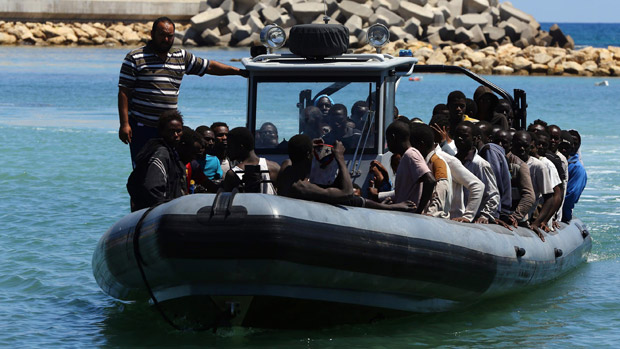Migration: why Libya is the critical link in a deadly chain
Most people trying to cross the Mediterranean without papers come through the lawless north African state of Libya

A free daily email with the biggest news stories of the day – and the best features from TheWeek.com
You are now subscribed
Your newsletter sign-up was successful
In a recent speech to the European Parliament, Pope Francis lamented that the Mediterranean has become "a vast cemetery" for illegal migrants trying to get to Europe. The Mediterranean is now the deadliest sea in the world for migrants, according to the International Organisation for Migration, and Libya is their gateway of choice.
Where do the migrants come from?
According to the International Organisation for Migration, most of the migrants trying to cross the Mediterranean are from war-torn Middle Eastern and African countries. Many were Syrians and Eritreans who arrived in Libya via Egypt and other African countries. Libya is just a few hours' boat journey from the Italian southern island Lampadusa.
The Week
Escape your echo chamber. Get the facts behind the news, plus analysis from multiple perspectives.

Sign up for The Week's Free Newsletters
From our morning news briefing to a weekly Good News Newsletter, get the best of The Week delivered directly to your inbox.
From our morning news briefing to a weekly Good News Newsletter, get the best of The Week delivered directly to your inbox.
How do they get to Libya?
One of the Syrian migrants told Al Araby Al Jadeed Arabic newspaper he entered Libya illegally through the border with Egypt. He paid Libyan smugglers to take him from the city of Baida, 120 miles east of Benghazi, to Tripoli. With the help of smugglers he was able to pass through Tripoli airport without any legal documents.
What happens to them next?
In Zwara, 75 miles south of Tripoli, hundreds of migrants are held in a small building guarded by members of armed militias. Al Araby Al Jadeed says that one group of Syrian and African migrants were poorly treated while being held in this building, and then herded onto a small dilapidated wooden boat. Only 100 out of 500 travellers on one boat were given life jackets.
A free daily email with the biggest news stories of the day – and the best features from TheWeek.com
Why Libya has become a base for illegal migration?
BBC Arabic says illegal migration increased in Libya after the fall of Muammar Gaddafi. The rule of law broke down and, in the absence of sufficient international assistance to rebuild its institutions, armed militias rose up to fill the power vacuum. Many of these militia are now involved in the profitable business of human trafficking
-
 The Olympic timekeepers keeping the Games on track
The Olympic timekeepers keeping the Games on trackUnder the Radar Swiss watchmaking giant Omega has been at the finish line of every Olympic Games for nearly 100 years
-
 Will increasing tensions with Iran boil over into war?
Will increasing tensions with Iran boil over into war?Today’s Big Question President Donald Trump has recently been threatening the country
-
 Corruption: The spy sheikh and the president
Corruption: The spy sheikh and the presidentFeature Trump is at the center of another scandal
-
 Epstein files topple law CEO, roil UK government
Epstein files topple law CEO, roil UK governmentSpeed Read Peter Mandelson, Britain’s former ambassador to the US, is caught up in the scandal
-
 Iran and US prepare to meet after skirmishes
Iran and US prepare to meet after skirmishesSpeed Read The incident comes amid heightened tensions in the Middle East
-
 Israel retrieves final hostage’s body from Gaza
Israel retrieves final hostage’s body from GazaSpeed Read The 24-year-old police officer was killed during the initial Hamas attack
-
 China’s Xi targets top general in growing purge
China’s Xi targets top general in growing purgeSpeed Read Zhang Youxia is being investigated over ‘grave violations’ of the law
-
 Panama and Canada are negotiating over a crucial copper mine
Panama and Canada are negotiating over a crucial copper mineIn the Spotlight Panama is set to make a final decision on the mine this summer
-
 Why Greenland’s natural resources are nearly impossible to mine
Why Greenland’s natural resources are nearly impossible to mineThe Explainer The country’s natural landscape makes the task extremely difficult
-
 Iran cuts internet as protests escalate
Iran cuts internet as protests escalateSpeed Reada Government buildings across the country have been set on fire
-
 US nabs ‘shadow’ tanker claimed by Russia
US nabs ‘shadow’ tanker claimed by RussiaSpeed Read The ship was one of two vessels seized by the US military